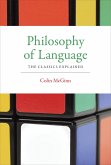In cognitive science, conceptual content is frequently understood as the "meaning" of a mental representation. This position raises largely empirical questions about what concepts are, what form they take in mental processes, and how they connect to the world they are about. In Minds without Meaning, Jerry Fodor and Zenon Pylyshyn review some of the proposals put forward to answer these questions and find that none of them is remotely defensible.
"Minds without Meanings is a very small book that attempts to do the very ambitious job of solving the problem of content. Fodor and Pylyshyn argue that the only semantic notion worth scientific attention is reference. Then they give an empirically grounded theory of reference. The book is vintage Fodor and Pylyshyn-densely argued, funny, infuriating. Great fun and a must-read." -Anthony Chemero, Professor of Philosophy and Psychology, University of Cincinnati; author of Radical Embodied Cognitive Science








